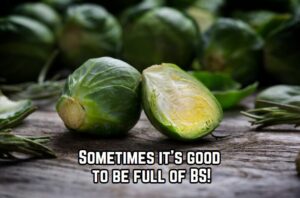 When you hear it is Brussels sprouts season…
When you hear it is Brussels sprouts season…
what is your reaction?
Are you excited, or are you thinking “ugh, I DO NOT like Brussels sprouts!”? If you don’t think you like them, you’re not alone. In fact, in many surveys, Brussels sprouts have shown up as the most hated vegetable in America!
Why do so many people despise this cabbage-like veggie?
For some, it may be caused by unpleasant memories of those soggy little cabbages our mothers tried to get us to eat when we were five years old. Yes, I’m speaking from experience (my mom put Brussels sprouts in the pressure cooker)! Or maybe it is a memory of overcooked Brussels sprouts that tasted bitter or even smelled like rotten eggs.
Whatever the reason, we are here to help blow those perceptions out of the water! And now is the time because Brussels sprouts are at their best from October through February. Plus, they are a fantastic addition to your holiday table!
What are Brussels sprouts?
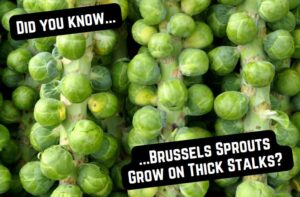 You may hear someone say they are baby cabbages, but they are not. Yes, they are closely related to the cabbage family; however, one difference is, with cabbage, you eat the heads that grow out of the ground whereas Brussels sprouts are actually buds that grow on a stalk.
You may hear someone say they are baby cabbages, but they are not. Yes, they are closely related to the cabbage family; however, one difference is, with cabbage, you eat the heads that grow out of the ground whereas Brussels sprouts are actually buds that grow on a stalk.
Brussels sprouts were cultivated in Belgium as early as the 16th century and most of the production in the U.S. currently takes place in California. There are dozens of varieties of Brussels sprouts that range in size from pea-sized to golf ball size.
Why should we be eating them on a regular basis?
Because they are extremely nutritious and powerful cancer fighters! One cup of Brussels sprouts is only 60 calories, and they are loaded with high levels of Vitamin A & C, folic acid, and fiber. One cup of Brussels sprouts has almost 100 mg of Vitamin C, even more than a medium orange, which has about 70 mg. In China, Brussels sprouts are used as medicine to improve digestive health. One cup contains 4 grams of fiber, which helps remove unwanted acids from your digestive tract and also helps lower cholesterol.
Because they are part of the cruciferous vegetable family, they have powerful cancer-fighting compounds. Brussels sprouts contain glucosinolates, which your body uses to make isothiocyanates, and then these compounds work to activate powerful cancer-fighting enzymes. Brussels sprouts have been linked to the prevention of a number of cancers, including colon cancer, ovarian cancer and others. Of course, all cruciferous vegetables are known for their cancer-fighting powers, and Brussels sprouts have been found to contain even greater amounts of glucosinolates than cabbage, kale, cauliflower and broccoli!
How do you pick and store them?
Brussels sprouts are considered at their best from October through February. They can survive the first frost and will continue growing until the first hard freeze hits. You want to purchase Brussels sprouts that are free of wilted or yellow leaves, and it is perfectly fine to purchase them still on the stalk. They will actually last longer if still on the stalk. Before eating, trim the stems and remove any yellow or discolored leaves. Once cut, you can store them in your refrigerator. Brussels sprouts are best eaten within one week of buying them.
How do you cook and eat them?
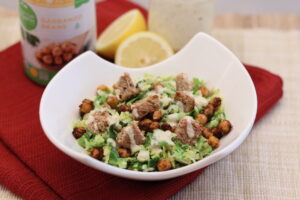 Some of us may THINK we don’t like Brussels sprouts because of an unpleasant experience where they were mushy or bitter – or maybe even had an unpleasant odor. This happens when they are overcooked (often, when they are boiled). This is due to the breakdown of a sulfur-containing compound in Brussels sprouts that, ironically, it is this same compound that contains the cancer-fighting characteristics!
Some of us may THINK we don’t like Brussels sprouts because of an unpleasant experience where they were mushy or bitter – or maybe even had an unpleasant odor. This happens when they are overcooked (often, when they are boiled). This is due to the breakdown of a sulfur-containing compound in Brussels sprouts that, ironically, it is this same compound that contains the cancer-fighting characteristics!
The great news is it is super-easy to prepare Brussels sprouts in ways that are delicious and allow you get the amazing health benefits. They have especially great flavors and textures when you roast them or sauté them. Believe it or not, you can also eat them raw – they are absolutely delicious shredded in the Brussels Sprouts Caesar Salad or take advantage of in-season pears and enjoy the Pear and Brussels Sprouts Salad!
Here are just a few flavor-popping delicious ideas to try…
don’t just take our word for it – see what other Eat REAL America members have to say!
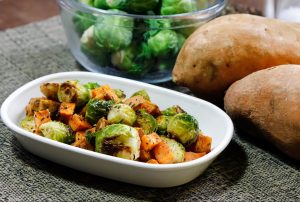 Seasoned Roasted Potatoes and Brussels Sprouts – “Three years ago, I never would have believed we’d enjoy Brussels sprouts so much! You’ve made converts of us.”
Seasoned Roasted Potatoes and Brussels Sprouts – “Three years ago, I never would have believed we’d enjoy Brussels sprouts so much! You’ve made converts of us.”
Sweet and Spicy Brussels Sprouts – “My family can’t get enough of these. Thanks for turning us on to Brussels Sprouts that taste SO GREAT!”
Kung Pao Brussels Sprouts – “I didn’t know I liked Brussels sprouts until I put them in the oven!”
Roasted Brussels Sprouts with Pears and Pistachios – “I made this for Thanksgiving and everyone loved it! The pear added a touch of sweetness and the pistachios gave a wonderful crunch–it was VERY VERY good!”
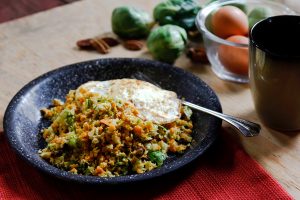 Brussels Sprouts Hash – “This recipe is SO incredibly good! Can’t wait to fix it again!”
Brussels Sprouts Hash – “This recipe is SO incredibly good! Can’t wait to fix it again!”
Kale and Brussels Sprouts Chopped Salad with Maple Almond Vinaigrette – “I was skeptical about this salad, but it was a huge hit at a recent family get-together!”
Strip Steak Over Shaved Brussels Sprouts – “Thank you Eat REAL America! Now we know we actually love Brussels sprouts!”
Shredded Brussels Sprouts with Pistachios, Cranberries & Parmesan – “So simple but SO delicious!”
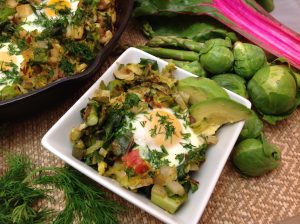 Green Shakshuka – “This one shocked me. We thought it would be fun to make for St. Patrick’s Day – we had no idea it would taste so good!”
Green Shakshuka – “This one shocked me. We thought it would be fun to make for St. Patrick’s Day – we had no idea it would taste so good!”
Zesty Apple and Brussels Sprouts Salad – “I made this for a get together a couple of weeks ago and it was a HUGE hit! Every bite has a burst of different flavors. Everyone was surprised that it was brussels sprouts and people that normally don’t like them really enjoyed this salad.”
Balsamic Shredded Brussels Sprouts – “Slowly but surely you are helping my husband and me learn to enjoy Brussels sprouts! This is a very yummy, easy side dish that I will definitely make again.”
Autumn Harvest Brussels Sprouts and Butternut Squash – “Wow, this is a good one. So easy to make. My boys loved it.”
Take note! Brussels sprouts are high in the blood clotting Vitamin K, so consuming substantial amounts can affect those on anti-blood clotting medications. To be on the safe side, talk to your doctor — you could even discuss ways to adjust medication if you are able to commit to including certain amounts of these types of vegetables, that are high in Vitamin K, in your daily diet.
Take the BS Challenge this fall!
Challenge yourself to fit in Brussels sprouts into your routine at least ONCE A WEEK for the month of October. Try it different ways, we think you will be a Brussels sprouts believer!
Here’s to becoming full of BS!
 LEARN MORE ABOUT THE NAPKIN!
LEARN MORE ABOUT THE NAPKIN!

Leave A Comment